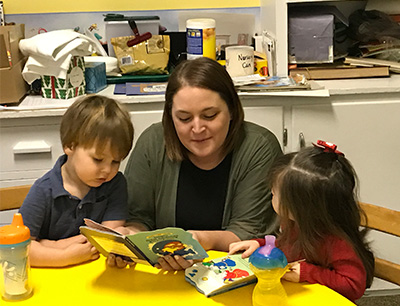We grow together in the light of Christ and bear witness to God’s work in the world.
Children and Youth Ministries
Sunday School, youth programs, service projects, Krislund Camp activities and Vacation Bible School bring our children and youth together.

Sunday School

Krislund Camp

Vacation Bible School
Bible Study

Choosing a Bible
It can be a bewildering experience to choose a Bible version or translation (what’s the difference there, anyway?). With over 450 English Bibles, there are so many to pick from! Which is best? What will help you read and understand the most? To make the right choice for you, there are really just a few important things to know.
Why are all the translations different?
If you compare all the available English translations of the Bible, you will notice lots of differences in wording, sentence length, and so on. These differences are not a result of personal preference or people changing the Bible! It surprises some to learn that there is no original copy of something called The Bible. The texts (books, letters, and other writings) that come together to form what we know as the Bible have come to us in ancient Hebrew, Aramaic, and Greek manuscripts. These different texts were compiled and edited by biblical scholars, theologians, and church leaders over hundreds of years. The Bible is more like an ancient library composed of stories and texts that have been passed down through generations, both as spoken and written word. And every one of those words was originally written in ancient languages. You can imagine that some of those ancient words and concepts have been lost over time, or that things that were important and meaningful to folks in the ancient world don’t mean as much in the 21st century, or mean something different altogether. All of our modern English translations are the result of different groups of translators trying to best capture the meaning of the original texts and put it into English. It is a challenging task undertaken with great faith and reverence.
What is the goal of the translation?
The main reason for all of the different English Bibles is that they each have different goals, called a “philosophy of translation.” The goal of some translations is to offer formal equivalence, in other words to match the English closely to the word order and structure of the Greek or Hebrew. These translations (such as the New American Standard) sometimes result in very awkward, difficult English sentences that are hard to read casually or understand easily. They are, however, great for close Bible study, especially when you want to delve into particular words in the Bible. The opposite end of the spectrum is called dynamic equivalence, which means the translators are mainly trying to produce an easy-to-read contemporary English translation. This often means they translate the ideas in the biblical passage, but do not offer a word- for-word representation of the biblical text (the New Living Translation is a great example). Other dynamic equivalent translations even adapt some of the ancient images and figures of speech in the Bible into modern ones (like the Message). Most English translations try to fit somewhere in between these two philosophies, producing normal English, but still mapping closely to original text (like the New Revised Standard Version, the New International Version, or the English Standard Version). The example below demonstrates the philosophy of translations on a continuum of more “formal” to more “dynamic” equivalence.
Galatians 2:16 according to different translation philosophies:
- New American Standard: yet knowing that a man is not justified by the works of the law but through faith in Jesus Christ, even we believed on Christ Jesus, that we might be justified by faith in Christ, and not by the works of the law: because by the works of the law shall no flesh be justified.
- Kings James Version: Knowing that a man is not justified by the works of the law, but by the faith of Jesus Christ, even we have believed in Jesus Christ, that we might be justified by the faith of Christ, and not by the works of the law: for by the works of the law shall no flesh be justified.
- New International Version: know that a person is not justified by the works of the law, but by faith in Jesus Christ. So we, too, have put our faith in Christ Jesus that we may be justified by faith in Christ and not by the works of the law, because by the works of the law no one will be justified.
- New Revised Standard Version: yet we know that a person is justified not by the works of the law but through faith in Jesus Christ. And we have come to believe in Christ Jesus, so that we might be justified by faith in Christ, and not by doing the works of the law, because no one will be justified by the works of the law.
- Contemporary English Version: But we know that God accepts only those who have faith in Jesus Christ. No one can please God by simply obeying the Law. So we put our faith in Christ Jesus, and God accepted us because of our faith.
- New Living Translation: Yet we know that a person is made right with God by faith in Jesus Christ, not by obeying the law. And we have believed in Christ Jesus, so that we might be made right with God because of our faith in Christ, not because we have obeyed the law. For no one will ever be made right with God by obeying the law.”
- The Message: We Jews know that we have no advantage of birth over “non-Jewish sinners.” We know very well that we are not set right with God by rule-keeping but only through personal faith in Jesus Christ. How do we know? We tried it—and we had the best system of rules the world has ever seen!
What Bible should I pick?
First, decide how you’re going to use this Bible. If it’s for study with dictionaries or commentaries, you may want something more on the formal equivalence end. If it’s for more rapid or casual reading, you likely want a translation leaning toward the dynamic equivalence end. Second, if you don’t own any biblical commentaries, consider getting a Study Bible, like the New Interpreter’s Study Bible or the NIV Life Application Bible. These contain maps, sidebar discussions, and commentary to provide insight into what you’re reading. Lastly, be sure to read a sample page or two before you buy anything. The most important thing about a translation is that you can and will read it.
Here are some options to consider:
- New American Standard Study Bible [Formal Equivalence]
- New International Version Study Bible [Balance between Formal and Dynamic Equivalence]
- New Revised Standard Version [Balance between Formal and Dynamic Equivalence]
- English Standard Version Study Bible [Balance between Formal and Dynamic Equivalence]
- Contemporary English Version [Dynamic Equivalence]
- New Living Translation [Dynamic Equivalence]
- The Message [Dynamic Equivalence]
You may also find the Bible Gateway website a help resource for choosing a Bible translation and studying a Bible passage. This website offers a wide array of Bibles in English translations, and even gives the option of seeing a single verse in all of the English translations in their database.
Small Groups
 Small groups meet for study, fellowship, and service.
Small groups meet for study, fellowship, and service.
The Shoebox Gang crafts gifts for Operation Christmas Child.
Laughter after Loss is a group of women who have experienced the death of a close loved one. The gathering meets to share stories, advice, shoulders and lunch and is open to the community.
